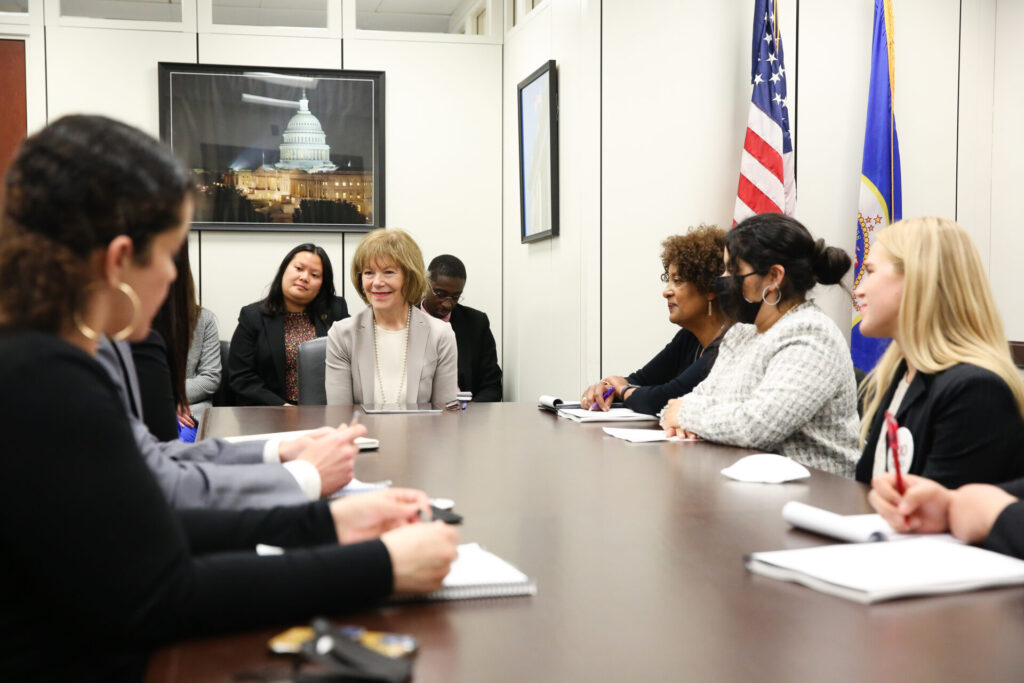
TRIO professionals share creative ways to pay for this life-changing event
One of the year’s highlights for TRIO professionals comes with the early days of Spring. That’s when COE holds its annual Policy Seminar, which this year will take place from Sunday, March 19, through Wednesday, March 22.
Policy Seminar starts with hands-on professional development at Sunday’s Leadership Summit for College Opportunity Professionals. It continues Monday with a seminar on the latest TRIO information from the U.S. Department of Education. And it winds up Tuesday and Wednesday with the Legislative Conference, which includes meetings on Capitol Hill with lawmakers. These Hill visits allow participants to share the latest statistics demonstrating the programs’ effectiveness locally. But, the primary purpose of the Legislative Conference is to ask legislators to increase funding for TRIO – and that’s lobbying. Several places in law, regulations, and your TRIO grant award say you can’t use federal funds to lobby.
The meetings on Capitol Hill are crucial for the continued growth and success of TRIO programs. They are among the most rewarding activities of the conference. Yet since they involve lobbying, federal grantees must budget differently. You cannot use grant funds for meals, transportation, and hotel charges on the days of the Legislative Conference. You also can’t use federal funds for what part of your air or other travel costs should reasonably “be allocated” to the Legislative Conference. While the grant restrictions concern some TRIO professionals new to the Seminar, three Policy Seminar veterans encourage others not to worry. You can create a plan to cover those costs.
Shelly Siegel, director of TRIO programs at North Hennepin Community College in Brooklyn Park, Minnesota, understands the hesitation on the part of staff members. “I understand why programs feel like they can’t do it. You have to talk to the finance folks [at your institution] to attend the portions of the Policy Seminar that the grant cannot cover.” It is worth it, she insists, and there is no replacing the impact of in-person visits. “Being on the Hill is very important. Zoom is not as effective as being in front of your Senators and Congressmen,” she emphasized.
Siegel pointed out that the institution gets a percentage of the grant money just for hosting the programs, which can be a significant amount. “Let’s say your grant is for $250,000. The college can take up to 8 percent of that. So, I negotiated with my college to give me money to cover costs not allowable through the grants. Since the amount they provide is less than the indirect costs the college receives, they were open to this suggestion. Participating in the Policy Seminar is an investment in keeping TRIO programs strong,” she said. Because the allocation comes from the college rather than directly with federal funds, it eliminates the need to use grant funds.
See who from TRIO is attending Policy Seminar and look for friends. Double up and triple up in the hotel room to reduce costs. All you need the hotel room for is to sleep. COE keeps you pretty busy!
Brad Gifford, Director of TRIO Programs at Tyler Junior College
Another way, she said, is for union members to approach their unions, which often have professional development funds to help cover opportunities once available from colleges during better times. It is worth the effort, she said. “Everyone who goes says it is a life-changing experience. Most people learn about how government works through TV. But this is real life. Policy Seminar allows you to sit down with staff people and talk to Members of Congress themselves,” Siegel said.
Sergio Galvez agreed with Siegel’s approach. He applied the skills from his first visit to Capitol Hill to lobby his university. Galvez is the senior director of TRIO pre-university programs at California Lutheran University, a position he has held since 2005.
During his early years working in TRIO, Galvez became the educational and legislative chair of his TRIO association in California. Because of his role in the association, the chapter financed his attendance at the Policy Seminar. “When my term ended, I wanted more of it.” He began reflecting on how little his university knew about Policy Seminar. “They didn’t know that their staff was part of an advocacy organization. I began to educate my leadership, so they valued the grants,” he said.
Galvez wrote a report listing the Seminar’s effectiveness, contending that their Hill visits were valuable on many levels. The professional development gained in attending the Seminar might enable staff to get more grants for the university, Galvez argued. The university agreed. Now California Lutheran sets aside funds annually for the TRIO staff to use for professional development, such as Policy Seminar.
Brad Gifford, the director of TRIO programs at Tyler Junior College in Tyler, Texas, said the Texas TRIO Association gives a stipend so those attending Policy Seminar can cover the lobbying portion of the visit. Gifford explained that any TRIO professional participating in the state delegation gets some of the hotel costs covered. “That’s the way to do it if you are from a large state,” he said.
He said that asking the university to cover your cost from the money gained from hosting the program is also a good strategy. But people can also save money while in Washington, he pointed out.
“See who from TRIO is attending Policy Seminar and look for friends. Double up and triple up in the hotel room to reduce costs,” he said. “All you need the hotel room for is to sleep. COE keeps you pretty busy,” he laughed.
Register for COE’s Policy Seminar, March 19-22, in Washington, D.C., to ensure TRIO continues to have a seat at the table. By Marching Towards One Million, we will continue to fight for students and continue the progress to strengthen TRIO in and beyond FY24. Learn more and register here.